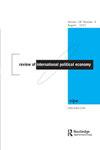核不扩散制度的不稳定性使其复杂化
IF 3.7
1区 经济学
Q1 ECONOMICS
引用次数: 1
摘要
本文章由计算机程序翻译,如有差异,请以英文原文为准。
The instability of the nuclear nonproliferation regime complex
Abstract This article theorizes path-dependent changes in the institutional architecture of the nuclear nonproliferation regime complex; it analyses the effects of different regime-complex structures on institutional contestation and policy adjustment. I first offer a general theory of how the preexisting institutional structures of international regime complexes (IRCs) facilitate and constrain subsequent institutional developments in ways that make IRCs prone to endogenous, path-dependent change. Next, I illustrate how strategies of regime shifting and rival regime creation in the nuclear nonproliferation complex have triggered path-dependent ‘reactive sequencing’, resulting in growing institutional fragmentation. To illustrate endogenous dynamics of IRC evolution, I examine the nuclear nonproliferation complex at three ‘critical junctures’: The mid-1970s, the end of the Cold War, and the early-2000s. During each period, exogenous proliferation shocks interacted with pre-existing institutional structures to produce specific patterns of contestation which set in motion a reactive sequence of growing institutional fragmentation. My argument has relevance for global economic governance broadly and for the growing IPE literature which explores reactive sequencing and institutional decay in global governance institutions.
求助全文
通过发布文献求助,成功后即可免费获取论文全文。
去求助
来源期刊
CiteScore
9.20
自引率
9.30%
发文量
47
期刊介绍:
The Review of Political Economy is a peer-reviewed journal welcoming constructive and critical contributions in all areas of political economy, including the Austrian, Behavioral Economics, Feminist Economics, Institutionalist, Marxian, Post Keynesian, and Sraffian traditions. The Review publishes both theoretical and empirical research, and is also open to submissions in methodology, economic history and the history of economic thought that cast light on issues of contemporary relevance in political economy. Comments on articles published in the Review are encouraged.

 求助内容:
求助内容: 应助结果提醒方式:
应助结果提醒方式:


